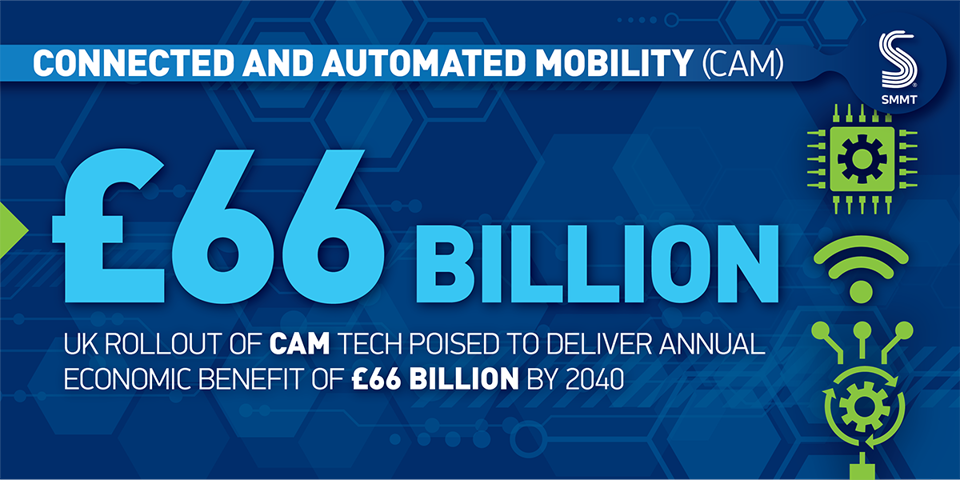Industry is calling for the UK Government to bring in swift legislation to help deliver a £66 billion annual economic uplift offered by connected and automated mobility (CAM) technology.
According to a new report by the Society of Motor Manufacturers and Traders (SMMT), Connected and automated mobility: The UK economic and market opportunities, a range of commercial applications from self-driving cars and logistics vehicles to automated buses, taxis, shuttles and even tractors could generate extensive socio-economic benefits for Britain.
CAM technology would also create 342,000 additional jobs across the economy from now to 2040, with 12,250 in automotive manufacturing, save 3,900 lives, prevent 60,000 serious accidents, drive down insurance premiums, and boost the efficiency of logistics and industrial processes.
The SMMT said that with a significant public-private investment of more than £600 million already committed to CAM testing since 2015, government and industry must now create the conditions to safely and responsibly deploy the technology across passenger cars, services and commercial and industrial vehicles.
The report, summarising a study by KPMG and funded by Innovate UK, with support from the Automotive Council and Zenzic, reveals that among eight markets, on-road logistics has the potential to be the largest, with annual revenue of £15.2 billion by 2040 from rolling out CAM tech in the sector – underscoring the importance of enabling these features in commercial HGVs and vans used in everything from long distance haulage to last mile home deliveries.
Implementing CAM tech in on-road passenger services, such as buses, taxis and ride-hailing, with a possible annual revenue of £3.7 billion, and off-road logistics, including vehicles used in warehouses, ports and airports, worth £2.3 billion per year by 2040, rank as the second and third largest markets. Some of the earliest deployment opportunities could also be found in the mining and agricultural sectors, given the nature of these environments with little or no public access.
The SMMT report authors said unlocking the significant benefits of safe and responsible CAM tech adoption is now highly dependent on government action. This means enacting relevant regulatory and legislative reforms urgently, with a particular focus on tabling new legislation on self-driving vehicles in the remainder of this Parliament.
All barriers to regulatory reform must be removed and this needs to be combined with an ambitious strategy to support private sector investment and stimulate innovation-driven growth, equip workers with essential digital and software skills through upskilling and reskilling initiatives, and engage the public through comprehensive education and communication programmes.
Mike Hawes, SMMT chief executive, said: “While fully automated road journeys are still some way off, advances in connected and automated mobility technology means they’re within our future – presenting a significant opportunity to revolutionise transport in the UK. Government must work with all stakeholders to implement the necessary framework needed to deliver this exciting revolution swiftly and effectively, ensuring that consumers can reap the lifesaving and cost saving benefits. Failing to do so risks leaving the UK in the slow lane, jeopardising our competitiveness and impeding growth and job creation."
Adrian Hallmark, Automotive Council UK joint Chair and Bentley Motors CEO, said: “Whether moving people or goods via highly automated cars, buses, trucks, construction machinery or material handling equipment, the deployment of CAM represents a once in a generation economic, societal and environmental opportunity for the UK. It has the potential to boost the whole transport sector, creating new supply chains, manufacturing and deployment opportunities. It could also help transform road safety, enable accessible transport, and deliver reduced energy consumption for environmental benefit through smoother, more efficient driving.

















Login to comment
Comments
No comments have been made yet.